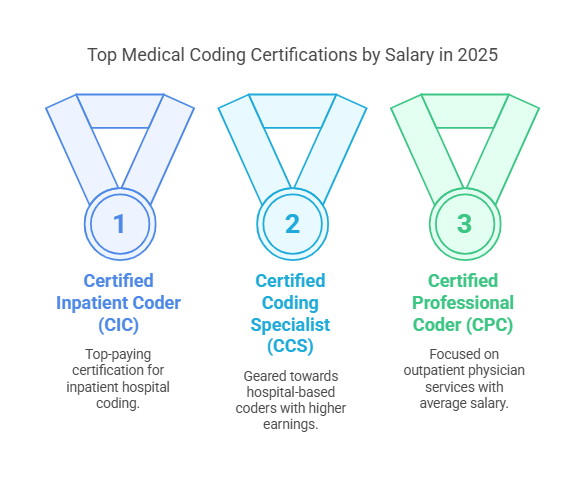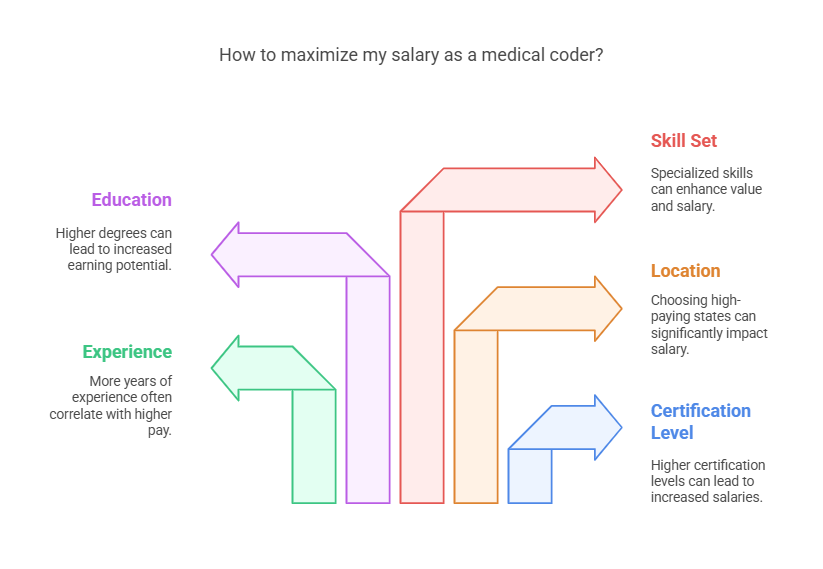Discover Which Medical Coding Certification Pays the Most
If you're aiming to grow your career in the healthcare field, particularly in medical coding, one of the most important decisions you'll make is choosing the right certification. As of 2025, the most lucrative medical coding certifications remain the Certified Professional Coder (CPC), Certified Coding Specialist (CCS), and Certified Inpatient Coder (CIC). These credentials not only validate your expertise but also have a significant impact on your salary potential.

The Role of Medical Coding and Why It Matters
Medical coding is the backbone of healthcare reimbursement. It involves translating diagnoses, procedures, and medical services into standardized codes using systems like CPT, ICD-10-CM, and HCPCS Level II. This ensures providers are accurately paid by insurers and allows for proper healthcare analysis and patient care continuity. Obtaining a medical billing and coding certification from AMBCI enhances professionals' skills in this field, ensuring accuracy and compliance with industry standards.
Beyond billing, accurate coding supports medical research, public health tracking, and policy-making. Without coders, healthcare systems would struggle to function efficiently. They serve as the critical link between healthcare providers and payers, ensuring the industry runs smoothly.
Top Paying Medical Coding Certifications in 2025
Let’s break down the certifications offering the highest pay:
Certified Professional Coder (CPC)
Offered by the AAPC, the CPC certification is focused on coding for outpatient physician services. As of 2025, CPC-certified professionals earn an average of $60,500 annually, depending on their experience and location. It remains one of the most recognized and respected certifications in the industry.
Certified Coding Specialist (CCS)
Issued by AHIMA, the CCS credential is geared toward hospital-based coders who work with both inpatient and outpatient records. Coders with this certification can expect to earn around $65,000 annually, with experienced professionals earning even more.
Certified Inpatient Coder (CIC)
Also offered by AAPC, the CIC certification is specifically for inpatient hospital coding. As of 2025, CIC-certified coders earn between $70,000 and $90,000 annually, making it the top-paying certification in the field. The role requires extensive knowledge of complex coding systems and hospital regulations.

Factors That Influence Medical Coding Salaries
1. Certification Level
Certified professionals typically earn 16% more than non-certified coders. Certifications act as proof of your skills and dedication to the profession.
2. Experience
More years in the field often correlate with higher pay. For example, a CCS-certified coder with 5+ years of experience can earn over $75,000 annually.
3. Location
States like California, New York, and Massachusetts offer some of the highest salaries due to demand and cost of living. In contrast, states like West Virginia offer lower average wages.
4. Education
Coders with a bachelor’s degree earn around $67,000, and those with a master’s degree or higher earn upwards of $81,500 per year.
5. Skill Set
Specialized skills such as auditing, risk adjustment, or EHR management can increase your value. Coders with multiple certifications and specialties earn significantly more.

Career Advancement in Medical Coding
Medical coders have many options for growth. Specializing in areas like oncology, emergency medicine, or anesthesia coding can lead to salary bumps. Leadership roles such as coding supervisor, compliance auditor, or HIM manager are natural progression routes.
Pursuing multiple certifications is also an excellent way to climb the ladder. Coders with three certifications report earning around $70,600 annually.
Tips for Boosting Your Earnings in 2025
Get Certified: CPC, CCS, and CIC are your best bets for higher income.
Earn Multiple Certifications: Two or more credentials can raise your salary by over 20%.
Keep Learning: Stay updated on coding changes and industry trends.
Network: Join professional organizations and attend conferences.
Consider Remote or Freelance Work: These often offer better pay and flexibility.

6 Lesser-Known Facts About Medical Coding in 2025
Remote coding positions are growing rapidly, with over 40% of certified coders now working from home full-time.
The AAPC's 2024 Salary Survey indicates that 65.7% of respondents work remotely full-time, a significant increase from 2017 when approximately 70% worked exclusively onsite. AAPC
Risk Adjustment Coding has emerged as one of the highest-paying niches, especially in Medicare Advantage plans.
Glassdoor reports that the estimated total pay for Risk Adjustment Coders is $99,214 per year, with an average base salary of $76,433. Job Search | Indeed+4Glassdoor+4Salary.com+4
Employers increasingly seek coders with data analytics skills, not just coding expertise.
Job postings highlight the demand for data analysts in risk adjustment coding, emphasizing the importance of data analytics skills alongside coding expertise. Job Search | Indeed
AI and automation are being used for initial coding suggestions, but human coders are still essential for compliance and accuracy.
The integration of AI in risk adjustment coding aims to improve accuracy, but human oversight remains crucial to address documentation errors and ensure compliance. Star Storm Digital
Some health tech companies now offer signing bonuses of up to $5,000 for CIC-certified coders.
While specific signing bonuses vary, health tech companies are offering competitive incentives to attract certified coders, including potential bonuses.
The demand for bilingual medical coders has risen, especially in states like Texas, California, and Florida.
Job postings in states like Texas, California, and Florida highlight the need for bilingual medical coders, reflecting the increasing demand in these regions.
Frequently Asked Questions
-
The Certified Inpatient Coder (CIC) remains the top-paying certification, with salaries ranging from $70,000 to $90,000.
-
Having at least two certifications can significantly increase your salary. Professionals with three certifications earn nearly $70,600 annually.
-
No, a degree isn’t mandatory, but having one—especially a bachelor’s or master’s—can improve job prospects and boost earnings.
-
Yes! Remote opportunities are abundant in 2025, especially for those with experience or specialization in inpatient or risk adjustment coding.
-
Risk adjustment, anesthesia, cardiology, and emergency department coding are among the most sought-after specialties in 2025.
Final Thoughts
Medical coding remains a stable and well-paying career path in 2025, especially for those who invest in the right certifications. Whether you're just starting out or looking to level up, pursuing certifications like CPC, CCS, and CIC will open doors to higher pay and better job prospects. Staying informed, continuously learning, and networking are key to long-term success.
